Dato Tan Chin Nam -
Master in Business and Chess
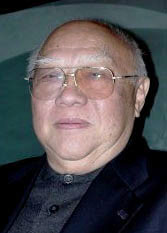
BY THEAN LEE CHENG
TAKE it from the master. Nothing happens by chance, not in the corporate world, not on the chessboard, not on the racing circuit and certainly not on the golf course. Not for Datuk Tan Chin Nam, the patriarch of the Tan family who controls IGB Corp Bhd.
He should know. He has been through all the booms and busts of an economic cycle, the rise of a company, the fall of another. Be it war or peace, he has been there.
Tan retired from the corporate world in the early 1990s and is no longer a director of any publicly listed company now. He, however, has substantial shareholdings in a couple of companies under the IGB group today. Gold IS Bhd and Wah Seong Corp Bhd being two of them.
"I retired at the age of 70. Nobody thought I would. I am now 77. Because to just make money, is that what life is all about? How much is enough? Will it ever be enough?
"A million was a lot of money before. Today, it is almost hay. It is not the RM200 million you make but whether you have the last RM100,000 when the bank calls for it. Businessmen learn this the hard way during every crisis."
No university taught him his business skills, no mentor. And forget the manuals.
Tan quit school at 16. "I passed standard seven and was supposed to go to Junior Cambridge," he recalls. World War II took care of that. But Tan is no less rich because of that. If anything, he may be the richer for it.
A mere lad, he went into the world of buying and selling. That was his first job. "On my first day of selling ayam (chickens), vegetables and fruits at the roadside, my former fellow students in the Victoria Institution saw me. I was malu (embarrassed), humbled even though I was making an honest living.
"There were no shops. Everybody was a broker, everybody traded. I was determined just to survive, not live. I didn't have the luxury of living. The moment I owned Straits Dollars (SD) 1,000, I was happy."
That SD1,000 came by luck. "Ninety per cent, it's pure luck," Tan says in his penthouse office suite at Menara Tan & Tan in Kuala Lumpur, his autobiographer Larry Parr present throughout the interview.
He bought a cash sweep, a form of empat ekor (numbers sweep) and won SD1,852.
"I used that as an investment tool to go into business and invested in a trading company called Wah Seong."
That name is significant. Today, Wah Seong Corp Bhd is a company with big plans. It aims to transform itself from a medium-sized Malaysian industrial group into "a major Asian/global oil and gas service infrastructure group" by the year 2007. Tan is a major shareholder there.
The company specialises in the coating of pipes used in the oil and gas industry. It took over the listing status of Perdana Industri Holdings Bhd last July 2002.
"My philosophy was simple. If I had Straits Dollars 10,000, I was one in 10,000 in South-East Asia in the old days, that's roughly where I would be standing. My ambition was to have SD20,000, and SD200,000 was the grand finale. After that, I stopped counting. Likewise with horses. After I had a stable of 20 horses scattered here and there, I also stopped counting. It no longer mattered how many horses I had, but how many times I won."
Tan is the only Asian to have won the Melbourne Cup, one of the oldest and most prestigious races in the world. Indeed, he is the only horse owner to have won it three times.
The Melbourne Cup is in the same league as the English Derby, America's Kentucky Derby and the Dubai Cup.
Twice in 1974 and 1975, it was with Think Big, a horse he co-shared with Malaysia's first Prime Minister Tunku Abdul Rahman in 1975 for his second win and the third was in 1996 with Saintly.
The largest stake money he ever won was the 1996 Melbourne Cup - A$600,000. Tan has horses in Hong Kong, Australia, Singapore, Malaysia and elsewhere.
After about 20 minutes, Tan changes pace, moving from a game of speed to one of intellect. "Enough of horses! Let's play chess."
Describing himself as a business man who is a chess player and not a chess player who happens to be a business man, Tan says he can play "eat and sleep" chess for days.
"You know why I enjoy it so much? It teaches discipline and it is a game that forces one to think. I have been promoting the game since 1974. There is a need in this country. Where do our young people spend their free time?
"Too many of them get involved in crime and drugs. In my time, we had the boy scouts. We caught spiders, played tops and marbles, had our fighting fish and swam in Dusun Tua.
"What do our young people do today? I saw the direction our youth were heading a long time ago and I am only sorry that the people in authority cannot see what I see."
Tan has been spending an average of RM100,000 annually since 1974 to promote the game. Besides the intellectual somersaults that the game accords him, Tan enjoys the friendships he has made over the years.
Comparing the manoeuvres on the chessboard with those in the business world, Tan says it is a wrong move (on the chessboard) versus a wrong word on the corporate field.
"If you offend someone in a game of chess, the worst
is that you are banned from playing. In the business world,
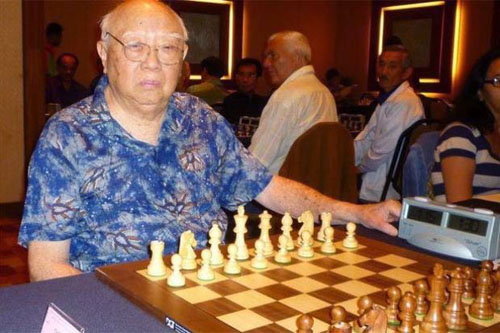 it is different. So you have to be very careful with what you say."
it is different. So you have to be very careful with what you say."
In the chess world, when you are with a chess friend, money does not count. In the business world, one is a friend because it serves a business requirement.
Tan once described friendship like a piece of music. It transcends time, culture, class and race. "I valued friendships then, as I do today. With a true friend, one does not seek to ask for help when in need. Help is offered even before one asks. In life, there are very few friends of that calibre.
"Each of the friendships made contributed to my life in different ways. There cannot be one single one that?"
Tan pauses, turning back the pages of his mind. Lost friends but not lost friendships.
"The Tunku (Malaysia's first Prime Minister Tunku Abdul Rahman) is one of them. We shared more than just Think Big, the horse which won the Melbourne Cup twice and which the Tunku co-shared with me for the second Melbourne Cup win in 1975. He paid me RM30,000 for his share of the horse. He confided a lot in me, although he was 23 years older than I."
"My philosophy on friendship has not changed. Always make new friends but never forget the old. Not only because the more friends you have, the happier you are, but also because the fewer enemies you have.
"I like to consider some chess moves now."
Tan still reaching for new
milestones
STORIES by ANGIE NG
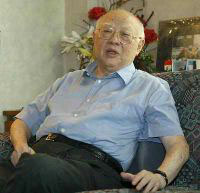 KUALA LUMPUR: Retired business tycoon Datuk Tan
Chin Nam may be approaching 80 and has made it to the list of the richest Malaysians,
but is still a man of mission and has new milestones to reach.
KUALA LUMPUR: Retired business tycoon Datuk Tan
Chin Nam may be approaching 80 and has made it to the list of the richest Malaysians,
but is still a man of mission and has new milestones to reach.
True to his calling as an accomplished and caring developer, Tan - "Mr Low-Cost Housing" of the 1970s - believes that developers should uphold their social responsibility by building houses for the less privileged members of society.
"In business, I am proudest of building the first low-cost housing in Malaysia, beginning with the Kampung Kongo project in 1975, which made owning homes a realistic prospect for the poor," he told StarBiz during an interview in conjunction with the upcoming release of his memoirs Tan Chin Nam: Never Say I Assume!
Being the country's first developer to build condominiums earned him the title of "Mr Condominium" when Desa Kudalari was completed in 1983.
As the founder of Tan & Tan Developments Bhd in 1971 and one of the founding partners of Ipoh Garden Bhd, which was later renamed IGB Corp Bhd, he was responsible for some of the real estate masterpieces such as Mid Valley Megamall and new lifestyle gated homes in Sierramas.
"My sentiments are Green. I was the first developer not to plough building sites as flat as a pancake griddle. In the case of Desa Kudalari, and my earlier project with the Shangri-La Hotel in Singapore, I kept much of the existing vegetation."
On how he sees the Tan group of companies going forward, Tan said: "There is a famous Chinese saying that the first generation makes the money, the second maintains it, the third spends it.
"I am sure that my children and those of my late brother, Tan Kim Yeow, are all very competent. The bottom line is that I hope the second generation will continue to expand the Tan group of companies. In property, the issue is whether IGB will be ready when large pension funds begin to put money into property and look for developers.
"In the new economy, the question is whether Goldis Bhd can capitalise on the growing wealth of Malaysia by providing services in such areas as broadband, health, beauty and so on."
Despite having announced his retirement in 1996 when he was 70, these days Tan still keeps busy in the things he likes to do.
Today, he is involved in two personal business enterprises - a company that provides pure water for factories and food processors and another that is involved in Internet commerce.
"My move into the Internet age is a challenge for someone my age, but I have learned at least a bit about the technological marvels of our time."
An avid reader, Tan keeps abreast of important current issues.
On the recent petrol price increase, he said that while it was inevitable for the Government to review the fuel subsidy policy (in the first place, he believes there should not be any subsidy at all), he said all the revenue collected should go towards improving the country's public transportation system.
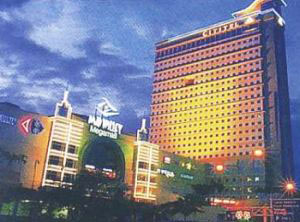
"The public should have an alternative way of moving around and, because of the petrol price increase, more people - especially those in the lower income group - have to find a cheaper mode of transport. The only way is having a well-coordinated and user-friendly transport system in place soon," he added.
In contributing time and in kind to the people, Tan initiated the Tan Chin Nam Foundation, which awards scholarships to needy university students.
Having kept a low profile for most part of the six decades of his enterprising years, Tan has finally come to terms with being a public figure.
The memoirs, written in collaboration with American writer Larry Parr, gives readers a chance to be up and close with Tan when he walked through his many experiences.
The memoirs, which will be published by MPH, will be available in book stores next Wednesday, is to "tell younger people what Old Malaya, the country of my youth, was like."
Tan describes the Depression years of the 1930s and how his family went from "riches to rags."
"I don't want these youngsters to be trapped totally in the present; I want them to have a sense of historical perspective. Many do not know about the cycle of life, which was evident daily to those in my generation because we lived much closer to nature.
"We must live in the present and for the future, but it helps to have a sense of perspective. When thinking about why I wrote the memoirs, big issues and major personalities seem less important to me than more homely concerns."
What about the key messages for readers?
"Work hard because there is no elevator to success. You have to climb the ladder one step at a time. Keep in mind that business is often far from glamorous. Thomas Alva Edison, the inventor of the light bulb and so much more, said that genius is 1% inspiration, 99% perspiration.
"Success comes in cans, failure in can'ts. The great painter Vincent Van Gogh remarked that when someone says you can't paint, then by all means paint! If you have a carefully thought-out vision, follow it."
Tan still reaching for new
milestones
EXCERPTS OF THE INTERVIEW WITH DATUK TAN CHIN NAM
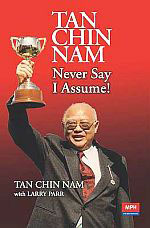 STARBIZ: How would you describe yourself when it
comes to managing a business empire and as patriarch of the Tan family?
What are your guiding tenets?
STARBIZ: How would you describe yourself when it
comes to managing a business empire and as patriarch of the Tan family?
What are your guiding tenets?
Tan: In one word, dedication. I dedicated a great part of my life to creating a group of companies. My "guiding tenets" were to mind capital carefully by launching innovative projects such as condominiums and hotel apartments in Malaysia that were not beyond the means of my companies.
Hong Kong shipping magnate Frank Tsao has said that it is not the hundreds of millions you make along the way that count; it is having the last million or even less when the bank calls your loan. People say that cash is king.
Based on my experience, cash is emperor; banking facility is king; and you are a prince among men, my friend, if you can pay off when the bank calls your loan.
StarBiz: What contributed to the successes in your life?
Tan: Hard work, perseverance and common sense. Common sense means understanding reality and acting correctly; you get common sense through hard work and seeking knowledge.
You come to know a subject so well that you have a sixth sense or common sense. What seems muddled to others is clear to you.
Some say that my having an English-language education may have given me the confidence to look to the West for ideas when working in property development. I have never been afraid of showing my ignorance by asking questions.
My friend, Datuk Yap Lim Sen, a former managing director of IGB and the man who headed the famous restoration of the Queen Victoria Building in Sydney, has said that my "secret of success" is the genius for choosing the right people and partners - and then to trust them.
Two underrated virtues in business are the will to survive and the capacity, quite simply, to trust people you have hired.
StarBiz: Whom do you consider important in moulding your outlook in life?
Tan: I dedicated my memoirs, Tan Chin Nam: Never Say I Assume!, to my mother Choo Moh Hooi. In my book I write about my mother possessing the strength to handle a family of 14. Her entire life inspired me.
There are also a couple of specific moments where she played a role in pointing me to my destiny. Early in my working career, she insisted I leave government employment in the British Military Administration. I took a 50% cut in pay, but her faith in me soon paid off.
A bit later, I was offered a job in the late 1940s for 36,000 Straits dollars annually, an inconceivably large amount of money at that time.
I turned down the offer, preferring to work for myself, remembering my mother's advice never to short-change my ambition.
StarBiz: Is writing this book a form of sharing with the people?
Tan: All of the royalties from my memoirs will go to the Tan Chin Nam Foundation and be used to provide scholarships to the needy. In financial terms, I will not profit by a penny.
In the beginning was the Word, and I hope that some of my words will be added to the sum total of human knowledge.
The message in my memoirs is that I spent a lifetime trying to make the world just a little better place for my having lived in it - and to provide for my family.
I was unquestionably a good provider for my family and, I hope though do not claim, that the sum of my business activity has been for the positive.
 The V.I. Web Page
The V.I. Web Page